Which Forklifts are Best for Heavy Duty Lifting?
Handling heavy loads is a big challenge for warehouses, construction sites, and logistics teams. Choosing the right equipment for moving large or heavy materials makes a real difference in how safe, efficient, and cost-effective your operations are.
Choosing a heavy-duty forklift with the right weight capacity helps keep operations reliable, cuts down on downtime, and boosts productivity. High-quality forklifts let companies handle tough lifting jobs efficiently while lowering risks and long-term costs.
Understanding Heavy-Duty Forklifts
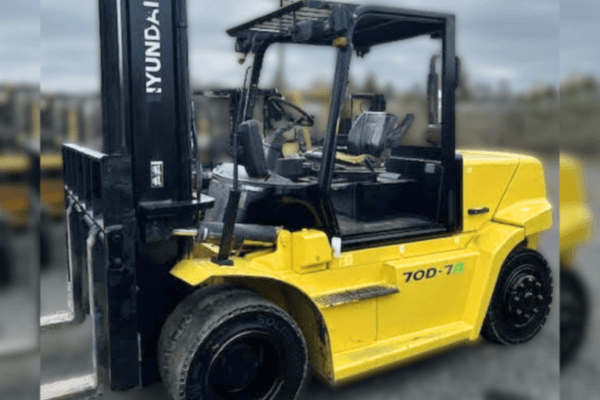
Heavy-duty forklifts are different from standard models because they have stronger frames, better hydraulics, and can handle heavier loads. They move items over 15,000 pounds and work well for long hours in tough conditions.
Key Features
The features that define industrial forklifts for heavy-duty lifting include:
- Reinforced Structure: A heavy-duty forklift comes with a strengthened chassis and mast for stability when handling oversized or dense loads. This prevents tipping and ensures steady performance under pressure.
- High Capacity Performance: Certain high-capacity forklifts can lift up to 100,000 lbs, allowing businesses to move extremely heavy items with confidence and efficiency.
- Durability in Harsh Environments: Built for industrial material handling, these machines endure demanding schedules, rough job sites, and challenging weather conditions.
- Reliable Long-Term Operation: Designed for continuous use, heavy-duty forklifts offer long service life, consistent reliability, and fewer interruptions from breakdowns.
Common Applications
Heavy-duty forklifts are essential across many sectors where oversized loads must be handled regularly:
- Warehouses and Distribution Centers: These facilities often store and move bulky pallets that require strong lifting solutions. Heavy-duty forklifts help streamline storage and retrieval tasks, ensuring goods are moved quickly and safely.
- Manufacturing Plants: Production facilities rely on industrial forklifts to move heavy machinery, steel, and raw materials. These machines make transporting items within the plant safer and more efficient.
- Construction and Outdoor Sites: Unpredictable terrain requires forklifts that can remain stable under stress. Heavy-duty models carry large loads of concrete, timber, and equipment across demanding outdoor locations.
- Shipping Yards and Ports: At ports and lumber yards, forklifts handle containers, timber, and other dense goods. High-capacity forklifts are critical for maintaining productivity where constant heavy lifting is required.
These industries rely on heavy-duty forklifts to maintain smooth operations and prevent costly disruptions.
Key Considerations for Heavy-Duty Lifting
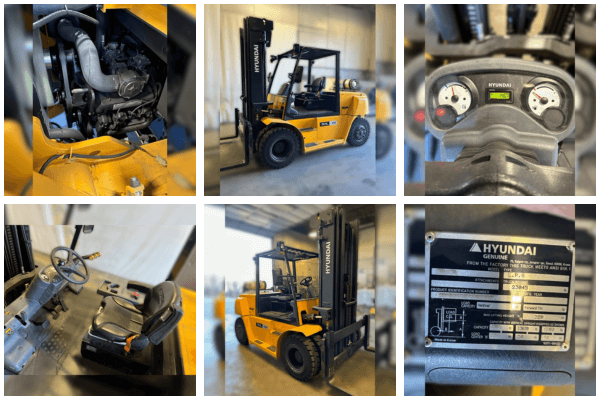
Choosing the right forklift begins with understanding operational needs. From load size to workplace conditions, each factor helps determine which industrial forklifts will perform best.
Load Capacity
Identify both average and peak loads your team will handle. Consider the load center distance, as it affects the forklift's effective forklift weight capacity. Selecting high-capacity forklifts that meet these needs ensures both safety and efficiency. Considering overall forklift capacity at both average and peak loads prevents costly errors and supports reliable operations.
Engine and Fuel Type
Fuel type plays an important role in performance:
- Internal Combustion Forklifts: Powered by diesel or LPG, these machines are ideal for outdoor and rugged work. They deliver high power and quick refueling, which helps maintain productivity in tough conditions.
- Electric Forklifts: Designed for indoor environments, electric forklifts operate quietly with zero emissions. They require charging instead of refueling, but often come with lower maintenance needs, making them practical for warehouses.
Choosing the right engine type ensures your forklift works well in your setting and fits your budget.
Mast Height and Reach
Different operations require specific reach capabilities:
- Low Mast Designs: These fit smaller warehouses with limited ceiling height, offering reliable lifting in confined areas.
- Extended Mast Options: Tall masts are needed for facilities with vertical storage. They provide safe reach to higher racks while supporting efficient handling.
The right mast height lets your team move materials efficiently and keeps work on schedule.
Operator Comfort & Safety
Modern forklifts are designed with operator well-being and workplace safety in mind:
- Ergonomic Seating and Controls: Adjustable seating and intuitive controls keep operators comfortable and focused during long shifts.
- Clear Visibility: Designs that reduce blind spots improve accuracy when working in busy or tight environments.
- Advanced Safety Systems: Features like stability control, collision alerts, and weight detection lower the risk of accidents and improve workplace safety. These advanced forklift safety features protect operators while enhancing confidence in daily use.
These features help your team work better and keep everyone and your equipment safe.
Budget and Total Cost of Ownership
While the purchase price is important, total ownership cost offers a clearer picture. Key factors include:
- Purchase or Lease Options: Companies should weigh buying versus leasing to balance upfront expenses with long-term flexibility.
- Energy Costs: Fuel or electricity expenses will influence long-term budgets and should be factored in carefully.
- Maintenance and Downtime: Reliable machines reduce costly downtime, while frequent repairs can quickly raise expenses.
- Operator Training: Training improves safety and efficiency but requires time and investment that must be included in planning.
A reliable heavy-duty forklift keeps your work steady and can save you money in the long run.
Top Brands and Their Heavy-Duty Offerings
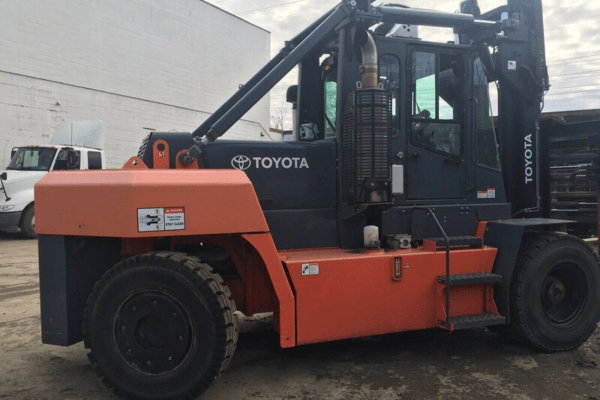
Several brands have earned reputations for producing dependable industrial forklifts for heavy lifting.
Toyota
Toyota delivers high-capacity forklifts capable of lifting up to 99,000 lbs. Their range is versatile and durable, making them a trusted choice for industrial material handling across many sectors.
Hyster
Hyster forklifts are built for rugged work, combining strength with durability. They are widely used in industries such as lumber, shipping, and construction, where heavy-duty lifting is constant.
Yale
Yale specializes in forklifts that work well in both indoor warehouses and outdoor yards. Their models lift between 19,000 and 28,000 lbs, providing strong mid-range solutions.
CLARK
CLARK, one of the oldest forklift manufacturers, is known for its reliable designs. Their industrial forklifts serve well in both warehouse and industrial settings where performance is vital.
Hyundai
Hyundai forklifts offer flexibility for indoor and outdoor use. They focus on efficiency, operator comfort, and technology, delivering a mix of performance and ease of use.
Royal
Royal forklifts are valued for their affordability and lifting strength. These industrial forklifts provide dependable service at a competitive price, appealing to cost-conscious businesses.
Types of Forklifts Ideal for Heavy Lifting
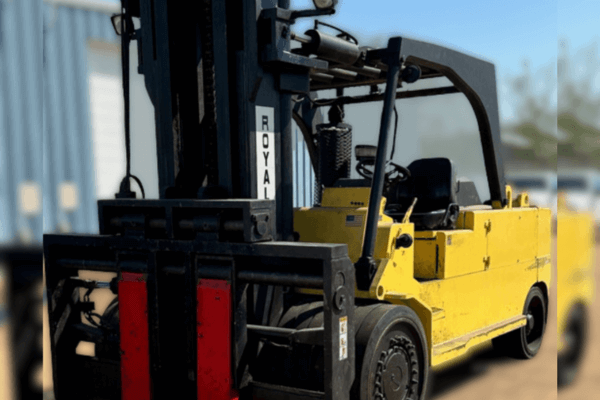
Every job has its own needs, so choosing the right forklift is key. The right fit helps your work go smoothly.
Internal Combustion (IC) Pneumatic Forklifts
IC pneumatic forklifts are well-suited for outdoor applications:
- Wide Lifting Range: With capacities from 15,000 lbs to 100,000 lbs, they can handle everything from heavy pallets to oversized components.
- High Horsepower Advantage: Strong engines deliver the power needed for rugged terrain, keeping performance consistent under demanding conditions.
- Quick Refueling Capability: These forklifts refuel quickly, reducing downtime and keeping operations on track.
While they work well outdoors, emissions make them less suitable for enclosed spaces.
Electric Heavy-Duty Forklifts
Electric forklifts are becoming a strong option for heavy lifting indoors:
- Heavy Lifting Ability: Some models lift more than 40,000 lbs, making them effective for warehouses and industrial environments.
- Clean Indoor Operation: With zero emissions, they protect air quality while maintaining high efficiency in enclosed areas.
- Low Maintenance and Quiet Performance: They require fewer repairs and run quietly, lowering operating costs and improving comfort in the workplace.
Electric forklifts might cost more upfront, but they often save you money over time.
High-Capacity Cushion Tire Forklifts
These forklifts are built for indoor environments with smooth flooring:
- Strong Lifting Power: Capable of managing up to 40,000 lbs, they are reliable for heavy warehouse loads.
- Compact Turning Radius: Their smaller turning radius makes them ideal for crowded spaces and narrow aisles.
- Ideal for High-Rack Storage: Perfect for warehouses with tall racks, they allow precise and secure placement of heavy loads.
However, they are less effective on rough outdoor terrain.
Telehandlers and Rough Terrain Forklifts
For construction and uneven outdoor conditions:
- Strong Load Capacity: These machines lift up to 12,000 lbs while reaching heights over 50 feet, making them suitable for tall building projects and outdoor handling.
- Versatile Equipment Features: Extendable booms, 4WD, and stabilizers provide flexibility and safety when dealing with uneven surfaces.
- Built for Tough Terrain: Specifically designed to perform where standard forklifts cannot, they provide stability and reliability on rough ground.
While not as precise in tight indoor areas, they are invaluable for outdoor lifting challenges.
Why Heavy Lifting Requires Specialized Forklifts
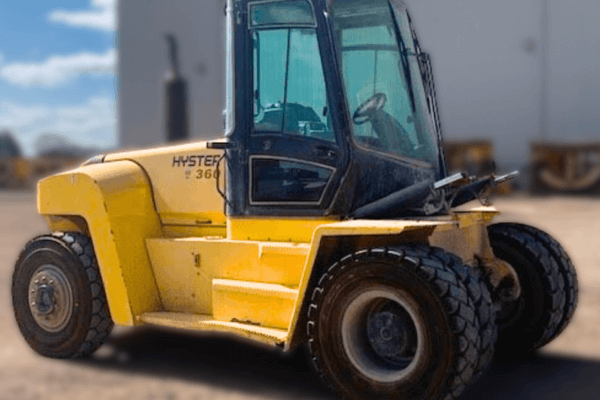
Standard forklifts are not designed to handle extreme loads. Using them for heavy-duty lifting increases the risk of breakdowns, delays, and workplace accidents.
Heavy-duty forklifts are equipped with stronger frames, enhanced hydraulics, and stability systems that make lifting oversized loads safer. Choosing specialized industrial forklifts ensures efficiency, protects employees, and prevents costly equipment damage.
Advantages of Reconditioned Forklifts
Buying new equipment isn't always possible for every budget. Reconditioned forklifts are a more affordable option and still deliver reliable performance.
Nationwide Availability
- Widespread Access: Reconditioned heavy-duty forklifts are available in multiple regions, allowing businesses to source equipment quickly and avoid unnecessary downtime.
Cost-Effective & Warranty-Backed
- Affordable with Protection: Reconditioned high-capacity forklifts are priced lower than new machines but still come with warranty coverage. This gives companies savings without compromising on peace of mind.
Trade-In and Resale Options
- Upgrade Opportunities: Many suppliers accept trade-ins, allowing businesses to replace old forklifts with updated models while recovering part of their investment.
Maximizing Industrial Material Handling Efficiency
To get the most out of heavy-duty forklifts, you need the right equipment, well-trained operators, and regular maintenance.
Matching Forklift Type to Job Requirements
Assess lifting needs, terrain, and environment before choosing a forklift. Matching the forklift type to specific tasks ensures smooth and effective industrial material handling.
Training and Safety
Trained operators reduce the chance of accidents and equipment damage. Good training extends the life of industrial forklifts and helps lower repair costs.
Routine Maintenance Tips
Preventive maintenance strengthens forklift reliability:
- Hydraulic System Inspections: Regular checks keep lifting systems safe and prevent sudden breakdowns. Monitoring the condition of the forklift hydraulic components is essential to maintaining consistent lifting power.
- Tire and Part Replacement: Replacing worn parts and tires promptly ensures consistent performance and safety.
- Battery and Fuel Care: Monitoring batteries or fuel systems helps forklifts remain dependable and ready for work.
Taking these steps helps your forklifts last longer and keeps downtime low.
Value Forklifts Commitment to Optimizing Your Material Handling with Trusted Forklifts
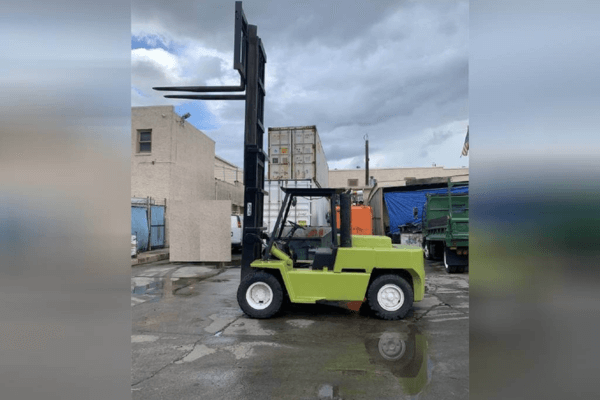
Value Forklifts has been helping businesses for over 30 years by supplying quality industrial forklifts at competitive prices. Our inventory includes more than 200 reconditioned machines, fully serviced and ready for use.
We carry brands such as Hyster, Yale, CAT, and Toyota, and offer nationwide shipping for convenience. Our experts match each heavy-duty forklift to the customer's operational needs, helping maximize efficiency and value.
Our mission is to provide affordable, reliable forklifts that support industrial material handling and keep business operations moving without interruption.
Conclusion
Selecting the right heavy-duty forklift directly affects safety, efficiency, and the overall success of material handling operations. Factors such as load capacity, fuel type, mast height, and operator comfort all play a role in choosing the best fit. Leading manufacturers, including Toyota, Hyster, Yale, CLARK, Hyundai, and Royal, supply high-capacity forklifts suitable for both indoor and outdoor applications, while different forklift types, such as IC pneumatic, electric, cushion tire, and rough terrain models, give businesses tailored solutions.
Reconditioned forklifts further expand these options by offering cost savings, warranty support, and trade-in opportunities. Combining reliable equipment with well-trained operators and a solid maintenance plan creates a safer workplace, reduces expenses, and ensures consistent performance in industrial material handling.
Take a look at Value Forklifts selection of reconditioned and high-capacity forklifts built for tough jobs. Get in touch with us today to find the right forklift for your needs and keep your business running smoothly.
